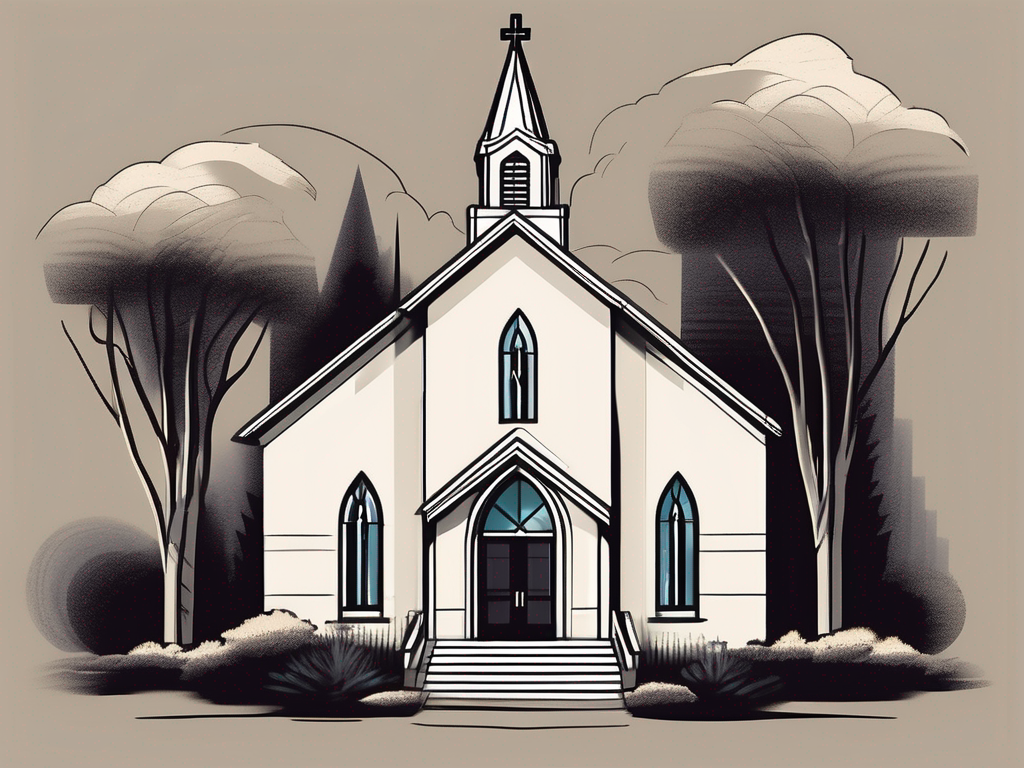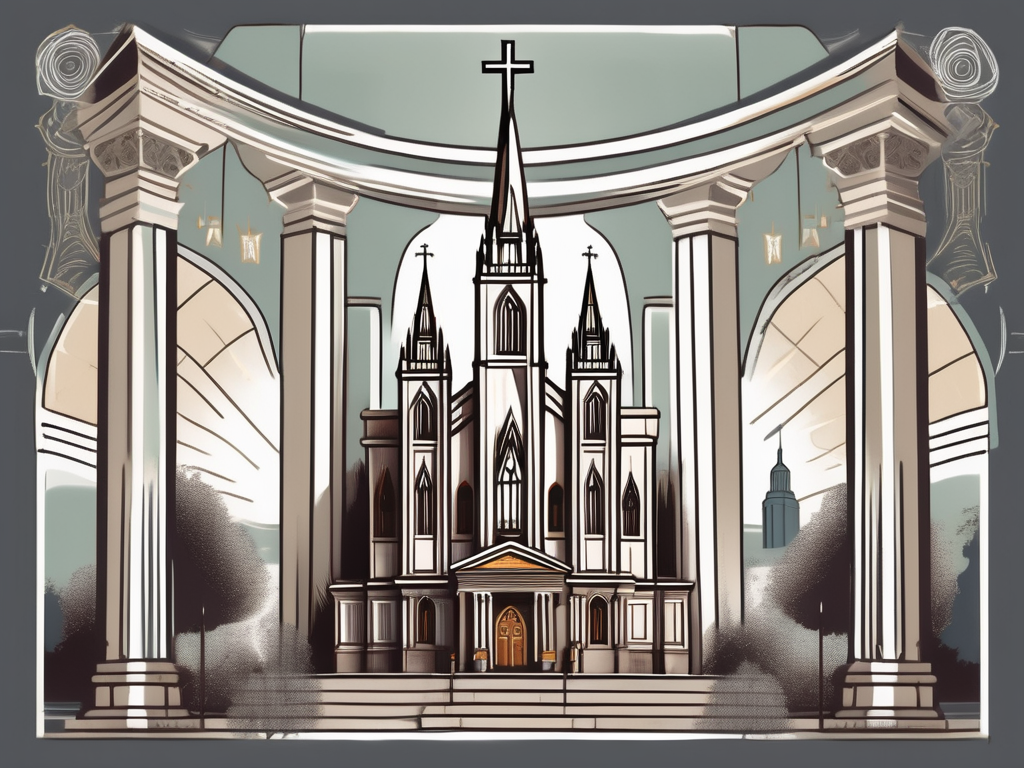Mormon beliefs on war have evolved over time, shaped by both historical circumstances and theological teachings. In this comprehensive guide, we will explore the various aspects of Mormon beliefs on war, including their historical overview, theological basis, doctrine on just war, views on military service, and controversies surrounding these beliefs. By the end, you will have a deeper understanding of this complex and nuanced topic.
Historical Overview of Mormon Beliefs on War
Before delving into the modern interpretations, it is crucial to examine the early Mormon views on war. In the early days of the Church, members faced persecution and violence. As a result, there was a sense of unity and defense among the Mormons. They saw themselves as a chosen people, destined to establish the Kingdom of God on Earth. This belief affected their perception of war and their preparedness to defend their faith and community.
During this time, Mormon settlements were not only religious communities but also self-sufficient societies. They had to rely on their own resources and protection. The early Mormons understood the importance of being prepared for any potential threats, including the possibility of armed conflict. They believed that defending their faith and community was not only a duty but also a means to ensure the survival and growth of the Church.
Fast forward to the modern era, and the Church has reassessed its stance on war. While the early views emphasized defense and protection, the emphasis has shifted towards peace and diplomacy. Mormons now strive to be agents of peace, following the teachings of Jesus Christ.
Early Mormon Views on War
During the early years of the Church, war was seen as a necessary means of self-defense. Mormon settlements faced opposition and violence, which led to conflicts such as the Utah War. Brigham Young, the second president of the Church, played a crucial role in providing guidance during this tumultuous time. He advocated for a preparedness to defend the Church and its members in the face of persecution.
Brigham Young’s leadership during the Utah War showcased the Mormons’ determination to protect their religious freedom and way of life. The conflict arose due to tensions between the federal government and the Mormon community, with accusations of rebellion and the imposition of a non-Mormon governor. The Mormons, feeling threatened, organized their defense and prepared for a potential armed confrontation. However, the conflict eventually ended through negotiation and peaceful resolution, highlighting the Mormons’ willingness to seek peaceful solutions whenever possible.
Modern Interpretations of War in Mormonism
In recent decades, the Mormon Church has taken a more pacifist approach to war. The emphasis is on promoting peace, resolving conflicts through diplomatic means, and respecting the agency of individuals in making decisions related to war. Modern interpretations of war within Mormonism align more closely with the broader teachings of Jesus Christ, emphasizing love, forgiveness, and non-violence.
Mormons today actively engage in humanitarian efforts around the world, providing aid and assistance to those affected by conflicts and natural disasters. They believe in the power of compassion and understanding to bring about positive change and healing in war-torn regions. The Church encourages its members to be peacemakers and to work towards creating a world where conflicts can be resolved without resorting to violence.
Furthermore, the Mormon Church places great importance on the principle of agency, which is the belief that individuals have the freedom to make their own choices. This principle extends to decisions related to war, where individuals are encouraged to carefully consider the consequences of their actions and to seek peaceful alternatives whenever possible. Mormons recognize that war should always be a last resort and that efforts should be made to exhaust all peaceful means of resolving conflicts before resorting to violence.
Theological Basis for Mormon Views on War
Central to understanding Mormon beliefs on war is an examination of their theological basis. Two primary sources inform these beliefs: the Book of Mormon and the teachings of Latter-day prophets.
Role of the Book of Mormon
The Book of Mormon, considered by Mormons to be another testament of Jesus Christ, provides insights into their beliefs on war. The book recounts numerous instances of war and violence and, at times, justifies defensive actions as necessary to protect their families and religious freedom.
One such instance is the story of Captain Moroni, a military leader in the Book of Mormon who fought to defend the Nephites against their enemies. Moroni is often seen as a symbol of righteous defense, as he sought to protect his people and their religious liberties. His actions, however, were not glorified as acts of aggression, but rather as a response to the threats faced by the Nephites.
However, the overall message of the Book of Mormon is one of peace and reconciliation. It teaches that war should be a last resort and that true disciples of Christ should strive to resolve conflicts peacefully.
The Book of Mormon also emphasizes the importance of forgiveness and turning the other cheek. It teaches that vengeance belongs to God and that individuals should seek to love and forgive their enemies, rather than seeking revenge or perpetuating cycles of violence.
Teachings of Latter-day Prophets
In addition to the Book of Mormon, the teachings of Latter-day prophets play a significant role in shaping Mormon beliefs on war. These prophetic voices provide guidance to Church members today, interpreting scripture and applying principles to modern contexts.
Latter-day prophets have consistently emphasized the importance of peace, encouraging dialogue and understanding. They have reaffirmed the Church’s stance on war, calling on members to be peacemakers and to work towards resolving conflicts without resorting to violence.
One such prophet who emphasized the pursuit of peace was President Gordon B. Hinckley. He often spoke about the need for individuals to seek peaceful resolutions and to avoid conflicts whenever possible. President Hinckley believed that war should only be considered as a last resort, when all other options have been exhausted.
Furthermore, the Church of Jesus Christ of Latter-day Saints has a long history of promoting humanitarian efforts and providing aid to those affected by war and conflict. The Church’s welfare program, for example, helps individuals and families in need, regardless of their religious affiliation or nationality. This commitment to humanitarianism reflects the teachings of Latter-day prophets and their emphasis on compassion and service.
In conclusion, the theological basis for Mormon views on war is multifaceted. While the Book of Mormon provides examples of defensive actions in times of conflict, it also teaches the importance of peace and reconciliation. The teachings of Latter-day prophets further reinforce the Church’s stance on war, emphasizing the pursuit of peace and the need to resolve conflicts peacefully. Through their scriptures and prophetic guidance, Mormons strive to live as peacemakers and promote understanding and compassion in a world often plagued by violence.
Mormon Doctrine on Just War
The notion of a “just war” is a component of Mormon beliefs on war. The Church recognizes that in certain circumstances, war may be justified if specific criteria are met.
In Mormon theology, the concept of a just war is deeply rooted in the principles of righteousness and moral conduct. It is believed that a just war is one fought for a righteous cause and conducted with strict adherence to moral principles. This belief stems from the understanding that God’s commandments guide human actions, even in times of conflict.
Within the framework of Mormonism, the criteria for a just war are carefully defined. Firstly, a legitimate authority must authorize the war, ensuring that it is not driven by personal interests or selfish ambitions. This authority is responsible for making the difficult decision of engaging in armed conflict, weighing the potential consequences and ensuring that it aligns with the greater good.
Furthermore, a just war must have a just cause. This means that it should be fought to defend the innocent, protect the oppressed, or preserve fundamental human rights. The cause must be morally sound and in accordance with the principles of compassion, justice, and equality.
In addition to having a legitimate authority and a just cause, a just war must also have a reasonable chance of success. This criterion emphasizes the importance of carefully evaluating the potential outcomes and ensuring that the war is not pursued in vain. It is believed that engaging in a war with little chance of success would only lead to further suffering and loss of life.
However, it is crucial to note that the concept of a just war in Mormon doctrine is not solely focused on military strategy or political considerations. The spirit in which the war is conducted is of utmost importance. A just war must be undertaken with a spirit of compassion and respect for human life. This means that every effort should be made to minimize civilian casualties and unnecessary suffering.
Peace and Pacifism in Mormonism
While Mormon doctrine acknowledges the possibility of a just war, it also places a strong emphasis on peace and non-violence. The goal is to exhaust all peaceful means before resorting to armed conflict. Mormons are encouraged to be actively engaged in peaceful negotiations, humanitarian efforts, and conflict resolution.
The teachings of the Church emphasize the importance of seeking peaceful resolutions to conflicts, promoting understanding, and fostering unity among nations. It is believed that true peace can only be achieved through dialogue, empathy, and a commitment to shared values.
Mormons are encouraged to be peacemakers in their communities and to actively work towards resolving conflicts through peaceful means. This can involve participating in mediation, promoting reconciliation, and advocating for justice and equality.
Furthermore, Mormonism teaches the importance of humanitarian efforts in times of conflict. The Church has a long history of providing aid and support to those affected by war, regardless of their religious or cultural background. This commitment to humanitarianism reflects the belief that every human life is valuable and deserving of compassion and assistance.
In conclusion, the concept of a just war within Mormon doctrine is a complex and nuanced one. While war may be justified under certain circumstances, the emphasis is always on seeking peace and exhausting all peaceful means before resorting to armed conflict. The principles of righteousness, compassion, and respect for human life guide the Mormon perspective on war, ensuring that any military action undertaken is done so with the utmost care and consideration for the well-being of all involved.
Mormonism and Military Service
The issue of military service is a nuanced one within the Mormon faith. While there is no absolute requirement to serve in the military, Mormons are encouraged to fulfill their civic duties and be good citizens.
Mormon Participation in Wars
Throughout history, Mormons have participated in various wars, both in defense of their communities and as part of their commitment to their country. This participation has included both individual service and organized military units.
The Church’s Stance on Military Service
The official stance of the Church is that decisions regarding military service are ultimately left to the individual’s conscience and personal conviction. Church leaders regularly encourage members to seek personal revelation and make informed decisions based on their circumstances and values. The Church supports and honors those who choose to serve in the military and also respects the choices of those who opt for other forms of service to their community and country.
Controversies and Criticisms
Mormon beliefs on war, like any other complex subject, have faced their fair share of controversies and criticisms. These debates and criticisms can come from both within the Mormon community and external sources.
Debates within the Mormon Community
Within the Mormon community, there are ongoing debates and discussions about the interpretation and application of principles regarding war. These debates often center around the appropriate response to different global conflicts and the role of the Church in promoting peace.
External Criticisms and Responses
From an external perspective, there have been criticisms directed at Mormon beliefs on war. Some argue that historical conflicts involving early Mormons are evidence of a more aggressive stance towards war. Others question the validity of just war theory within the framework of Mormonism.
In response to these criticisms, Mormons often point to their teachings on peace, their emphasis on diplomacy, and their commitment to peaceful resolution of conflicts. They also emphasize that beliefs and interpretations may vary among individuals within the wider Mormon community.
In conclusion, understanding Mormon beliefs on war requires a comprehensive examination of their historical evolution, theological basis, doctrine on just war, views on military service, and the controversies surrounding these beliefs. Central to their beliefs is a commitment to peace and non-violence, acknowledging the importance of resolving conflicts through peaceful means whenever possible. The complexities and nuanced nature of this topic highlight the ongoing discussions and debates within the Mormon community and society at large.












